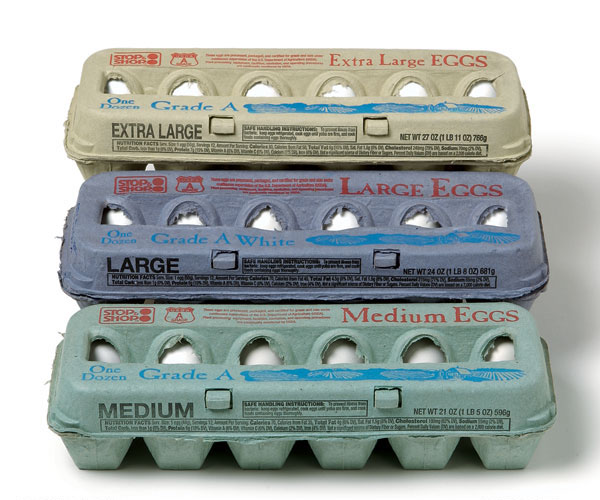Baking 101: Does Egg Size Matter in Baking?
Recently I made a batch of my tried and true Andes Mint Chocolate Cookies (which recipe I will post the Cook'n file for at the bottom) and had bought Jumbo size eggs at the store without thinking twice about it. I make these cookies all the time so I know by heart the consistency the dough always is when making them. This time they were MUCH more liquidy and sticky than usual. I was seriously contemplating whether to add flour or something to them to make them the usual consistency. I am certainly not an expert baker or anything, so I wasn't sure if adding flour would help or hurt them and didn't know what to do. Ultimately, I decided to leave them alone and just kind of dropped them by the spoonful onto my baking sheet, kind of how you do with pumpkin chocolate chip cookies, and somehow they still turned out great. It really led me to think about egg size and if it matters in cooking. This experience obviously taught me that it definitely did matter in this instance and totally changed my dough. So here's the deal:
Here in the US we have different size eggs: medium, large, extra-large, and jumbo.

Large eggs are about 57 grams or 3 1/4 tablespoons of egg. Extra-large eggs are about 64 grams, or 4 tablespoons of egg. Jumbo eggs are even larger.
Most baking recipes call for large eggs. If a recipe calls for two large eggs, that means the proportions of the recipe are counting on about 6 1/2 tablespoons of liquid egg. If we were to use extra-large or even jumbo eggs in place of large eggs, we'd adding far more liquid that the recipe proportions account for.
If a recipe does not indicate the size egg to use, stick with large.
When size doesn't matter
If your recipe doesn't depend on the right proportions of eggs to succeed-you're making scrambled eggs, a frittata, a strata, or using a beaten egg to coat cutlets or bind fritters-use whatever size egg you have on hand. Simply substitute one extra-large egg or one medium egg for one large egg. If that recipe (say, the frittata) happens to call for large quantities of eggs, you can use the information below for a little better accuracy.
If your recipe calls for four or more eggs…
In non-baking recipes, if you're substituting only one, two, or three extra- large or medium eggs for large eggs, simply make a one-to-one direct substitution. Beyond that, use these equivalents:
• in place of 4 large eggs, use 4 extra-large or 5 medium
• in place of 5 large eggs, use 4 extra-large or 6 medium
• in place of 6 large eggs, use 5 extra-large or 7 medium
When size does matter
If your recipe depends on the proportion of eggs to succeed (you're baking a cake, making custard, etc.), and you don't have the large eggs the recipe
calls for, you'll want to measure the volume of your substitute eggs (you'll need to blend them first), and use the amount equivalent to what the large
eggs would have yielded:
• 1 large egg, beaten = 3-1/4 Tbs.
• 2 large eggs, beaten = 6-1/2 Tbs.(1/4 cup plus 2-1/2 Tbs.)
• 3 large eggs, beaten = 9-2/3 Tbs.(1/2 cup plus 1-1/2-Tbs.)
• 4 large eggs, beaten = 12-3/4 Tbs.(3/4 cup plus 1 tsp.)
• 5 large eggs, beaten = 1 cup
- joythebaker.com/2013/10/baking-101-why-we-use-large-eggs-in-baking/
- www.finecooking.com/articles/does-egg-size-matter.aspx?pg=0
 Mary Richardson
Mary Richardson
Weekly Newsletter Contributor since 2014
Email the author! mary@dvo.com
